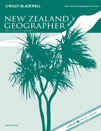
New Zealand Geographer
Scope & Guideline
Unveiling Insights into Global and Regional Geographies
Introduction
Aims and Scopes
- Cultural Geography:
The journal frequently explores the intersections of culture, music, and geography, emphasizing how cultural practices shape and are shaped by spatial contexts. - Indigenous Studies:
A significant focus is placed on Māori and other indigenous perspectives, exploring issues of representation, governance, and cultural heritage within geographical frameworks. - Urban and Regional Studies:
The journal examines urban dynamics, including gentrification, public transport, and housing, particularly in relation to New Zealand's unique socio-economic landscape. - Environmental Geography and Sustainability:
There is a strong emphasis on environmental issues, including climate change adaptation, water governance, and ecological restoration, reflecting the journal's commitment to sustainability. - Social Justice and Inequality:
The New Zealand Geographer addresses themes of social justice, migration, and inequality, focusing on how geographical factors influence social dynamics and access to resources.
Trending and Emerging
- Music and Place:
The exploration of music's role in shaping urban identity and place-making is increasingly prominent, suggesting a growing interest in the cultural dimensions of geography. - Climate Change and Resilience:
Research focusing on climate change adaptation strategies and resilience is on the rise, reflecting the urgent need to address environmental challenges in Aotearoa. - Indigenous Governance and Rights:
There is an increasing emphasis on Māori governance and rights, particularly in relation to environmental management and resource use, as these issues gain political and social traction. - COVID-19 and Its Impacts:
The pandemic has spurred a surge of research examining its geographical impacts, including public health responses, social cohesion, and mobility patterns, highlighting the significance of geography in understanding crises. - Social and Spatial Justice:
Themes surrounding social justice, including migration, urban inequality, and community resilience, are gaining traction, reflecting broader societal movements and calls for equity.
Declining or Waning
- Historical Geography:
While historical perspectives provided valuable insights into geographical development, recent publications indicate a decline in this focus, possibly overshadowed by contemporary issues. - Traditional Environmental Studies:
There seems to be a waning interest in purely traditional environmental studies without a socio-political context, as more integrative approaches become prevalent. - Rural Studies:
Themes centered on rural geography and agricultural practices have become less frequent, suggesting a shift toward urban-centric research in the journal's scope. - Global Comparisons:
Comparative studies that place New Zealand in a broader global context appear to be less common, with a trend towards more localized studies that prioritize Aotearoa-specific issues. - Conventional Economic Geography:
Research focusing solely on economic geography without consideration of social and environmental impacts is less prominent, indicating a more holistic approach to geographical analysis.
Similar Journals

Geographical Review of Japan-Series B
Informing Policy through Rigorous Geographic ResearchGeographical Review of Japan-Series B, an esteemed publication by the Association of Japanese Geographers, serves as a vital platform for scholarly discourse in the field of geography, focusing on the nuanced socio-economic and environmental dynamics of Japan. With the ISSN 1883-4396, this journal aims to publish rigorous, peer-reviewed research that contributes to understanding Japan's geographic phenomena and informing policy-making. Although it is not an open-access journal, it provides insights accessible to researchers, professionals, and students seeking a deeper engagement with regional and international geographical discussions. With its commitment to excellence in academic contribution, the Geographical Review of Japan-Series B remains an essential resource for those dedicated to advancing geographical knowledge in Japan and beyond.
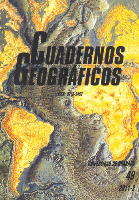
Cuadernos Geograficos
Bridging theory and practice in planning and development.Cuadernos Geograficos is a distinguished open access journal published by UNIV GRANADA in Spain, dedicated to advancing the fields of geography, planning, and earth-surface processes. With an ISSN of 0210-5462 and E-ISSN 2340-0129, this journal has been serving as an essential platform for scholars since its inception in 1983. By providing rigorous peer-reviewed research, Cuadernos Geograficos contributes significantly to the academic discourse within these disciplines, holding a respectable position in the Q3 category for both Earth-Surface Processes and Geography, Planning, and Development as of 2023. The journal is indexed in Scopus, ranking #431/821 in Social Sciences and #100/179 in Earth and Planetary Sciences, affirming its relevance and impact within the scholarly community. With its commitment to open access since 1999, Cuadernos Geograficos ensures that vital research is accessible to a diverse audience of researchers, professionals, and students, fostering knowledge sharing and collaborative advancements in the geographical sciences.
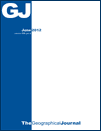
GEOGRAPHICAL JOURNAL
Exploring earth-surface processes through rigorous scholarship.Geographical Journal, published by Wiley, is a leading scholarly resource dedicated to advancing the field of geography and earth-surface processes. With an established history dating back to 1973, this prestigious journal thrives on disseminating high-quality research, featuring a robust archive that encompasses critical insights from various geographical and environmental studies. As evidenced by its impressive Q1 rankings in both Earth-Surface Processes and Geography, Planning and Development, the journal stands out in its commitment to impact and relevance in the academic community. Although not Open Access, the journal provides researchers, professionals, and students with invaluable peer-reviewed articles essential for understanding complex geographical phenomena. Whether you are focused on socio-environmental interactions or earth sustainability, Geographical Journal serves as a cornerstone for innovative research, fostering knowledge that shapes policy and practice.

Southeastern Geographer
Championing Diverse Perspectives in Geographical ResearchThe Southeastern Geographer is a prominent academic journal published by the Association of American Geographers, dedicated to advancing knowledge in the fields of Earth and Planetary Sciences and Geography, Planning and Development. With an ISSN of 0038-366X and an E-ISSN of 1549-6929, this journal has been a staple in geographical scholarship since its inception, offering a platform for diverse research that spans over four decades, specifically from 1979 to 1994 and then from 1996 to 2024. The journal is currently classified in the Q3 category within its fields, indicating its significant influence in shaping contemporary geographical discourse. Researchers, professionals, and students alike benefit from its rigorously peer-reviewed articles that explore regional studies, environmental issues, and sociocultural dynamics, making it essential for anyone interested in the interconnectedness of geography and society. As a vital resource for advancing geographical education and research, the Southeastern Geographer continues to engage its audience with innovative insights and scholarly contributions.

GEOGRAFICKY CASOPIS-Geographical Journal
Navigating the landscape of contemporary geographical research.GEOGRAFICKY CASOPIS-Geographical Journal is a prestigious publication dedicated to advancing knowledge in the fields of geography and earth sciences, published by the SLOVAK ACADEMY OF SCIENCES, INSTITUTE OF GEOGRAPHY. With a rich history dating back to its inception in 1976, the journal serves as a vital forum for researchers and professionals to disseminate their findings across a range of topics including earth-surface processes, geography, planning, development, and geology. Notably, it maintains a respectable Q3 category ranking across these disciplines as of 2023, indicating its contribution to relevant academic discourse. The journal is indexed under critical databases and engages a global audience, making it an essential resource for scholars seeking to stay informed about contemporary issues and advancements in geography. Although currently not an open-access journal, it emphasizes the sharing of significant research findings and encourages submissions from various geographical contexts to enrich the scientific community. Geographical Journal's commitment to fostering interdisciplinary dialogue ensures its relevance and importance in shaping the future of geographical research.

TIJDSCHRIFT VOOR ECONOMISCHE EN SOCIALE GEOGRAFIE
Bridging Economics and Geography for a Better TomorrowTIJDSCHRIFT VOOR ECONOMISCHE EN SOCIALE GEOGRAFIE, an esteemed journal published by WILEY, provides a premier platform for the dissemination of cutting-edge research within the fields of economics and social geography. With an ISSN of 0040-747X and an E-ISSN of 1467-9663, this journal has established itself as a pivotal resource, exhibiting a remarkable Q1 ranking in both Economics and Econometrics as well as Geography, Planning and Development for 2023. Notably, it is positioned in the 95th percentile among 821 journals in its category of Social Sciences, and ranks 46th among 716 in Economics and Econometrics, underscoring its influential role in shaping academic discourse. The journal, which has been in publication since 1967 and is anticipated to run through 2024, invites contributions that explore the intricate interplay between economic phenomena and social geospatial dynamics. Researchers, professionals, and students are encouraged to engage with its findings, which are crucial for understanding contemporary socio-economic challenges and innovations on a global scale.
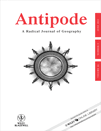
ANTIPODE
Unveiling the Dynamics of Earth-Surface ProcessesANTIPODE is a leading academic journal published by WILEY, renowned for its contributions to the fields of Earth-Surface Processes and Geography, Planning, and Development. With an impressive impact factor and ranked in the Q1 category for both Earth and Planetary Sciences and Social Sciences, it is a pivotal resource for researchers and professionals who seek to explore the complex interplay between social and environmental dynamics. Since its inception in 1969, ANTIPODE has provided a platform for innovative and critical scholarship, fostering discussions that drive forward-thinking research in its domain. The journal's rich history continues into 2024, as it remains committed to publishing high-quality, peer-reviewed articles that challenge norms and inspire further research. Researchers, professionals, and students will find in ANTIPODE not only a journal but a community dedicated to advancing knowledge and practice in geography and development studies.

CyberGeo-European Journal of Geography
Exploring the Frontiers of Geographical KnowledgeCyberGeo-European Journal of Geography, published by CYBERGEO, is a leading open-access journal that has been at the forefront of geographical research since its inception in 1996. With a dedicated focus on the multifaceted dimensions of geography, the journal aims to disseminate innovative and critical insights into geographical phenomena in Europe and beyond. The journal has established itself in the academic community, currently holding the Q3 quartile ranking in the Social Sciences (miscellaneous) category for 2023 and recognized within Scopus as #428 out of 604, placing it in the 29th percentile. CyberGeo publishes original research articles, thematic issues, and reviews that contribute to the advancement of geographical knowledge, making it an essential resource for researchers, professionals, and students alike. Situated in Paris, France, the journal embraces a truly international perspective and invites contributions that stimulate scholarly debate and further the understanding of spatial dynamics. By providing open access to its content, CyberGeo ensures that its research is accessible to a global audience, promoting knowledge sharing and collaborative exploration in the field of geography.
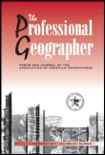
PROFESSIONAL GEOGRAPHER
Unveiling Insights in Geography and Earth-Surface ProcessesPROFESSIONAL GEOGRAPHER is a prominent journal in the fields of geography and earth-surface processes, published by Routledge Journals, Taylor & Francis Ltd. With a rich history dating back to 1949 and continuing through 2024, it serves as a vital platform for researchers, professionals, and students to explore and disseminate groundbreaking research and insights within the geographical sciences. The journal holds a respectable impact factor, placing it in the Q2 quartile for both Earth-Surface Processes and Geography, Planning and Development as of 2023, highlighting its importance in these critical academic areas. The journal ranks #273 out of 821 in Geography and Planning and #70 out of 179 in Earth and Planetary Sciences on Scopus, reflecting its robust contribution to advancing knowledge in social sciences. Although it does not currently offer open access options, it still provides invaluable content that influences pedagogy and research in geography. Its comprehensive scope invites a wide range of geospatial topics, encouraging interdisciplinary dialogue and collaboration across the global academic community.

Geographia Polonica
Elevating Geographic Scholarship Since 1972Geographia Polonica is a premier academic journal published by the Polish Academy of Sciences, Institute of Geography and Spatial Organization, renowned for its contributions to the field of geography and related disciplines. With a history spanning from 1972, it has evolved into a vital resource for researchers and professionals, addressing a wide spectrum of topics from cultural studies to urban planning and development. Geographia Polonica is indexed with impressive rankings in various categories, including a Q1 classification in Cultural Studies and significant positions in Earth and Planetary Sciences and Urban Studies, reflecting its influence and recognition in these critical areas. Although it operates under a traditional subscription model, its commitment to high-quality, peer-reviewed research ensures that the latest findings and advancements are accessible to the academic community. With its rich archival content and contemporary insights, Geographia Polonica serves as an essential platform for scholarly dialogue, making it an invaluable reference for students, researchers, and professionals eager to explore the complexities of spatial organization and geographical phenomena in a global context.